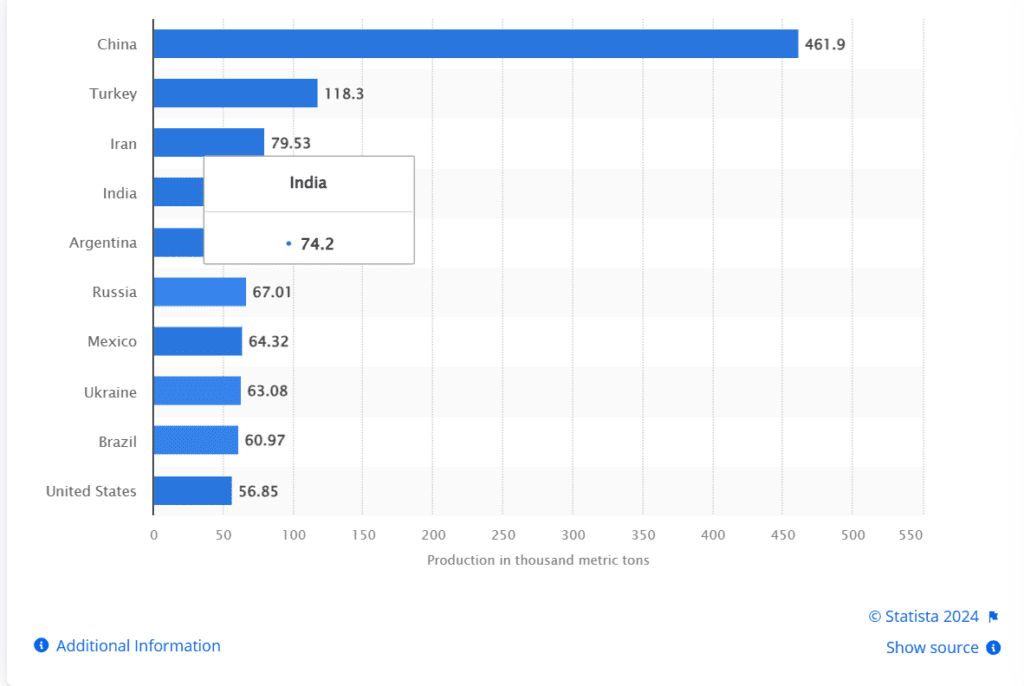

How to Start a Honey Business in India?
India’s honey business is booming as the market for natural and organic products rises. If you are a bee enthusiast, health-conscious consumer, or an individual looking to start a honey business in India purely based on an opportunity that promises profit, this will be a thrilling and fulfilling venture.
According to the reports by Statista, organic honey is pesticide and chemical-free. It is manufactured according to similar standards that other organic products abide by. The market for organic honey is, therefore expected to hit 1.8 billion U.S. dollars in 2032.
However, non-organic honey still leads the market since the total market for natural honey is estimated to surge past 11.8 billion U.S. dollars by 2028.


Before going into the sweet business, it is essential to consider all the related aspects of the business from sourcing honey to marketing it successfully. We will discuss the entire process of how to start a honey business venture in India, step by step, along with key steps and tips for its success here in this blog.
Why Start a Honey Business in India?
India is one of the largest honey-producing countries in the world; many regions have a blooming culture in bee-keeping. Awareness of the health benefits that honey brings out is increasing, thereby increasing demand.
Honey is not just an organic sweetener but also has medicinal properties, making it popular among health-conscious consumers. With more emphasis on organic farming and increasing demand for chemical-free products, organic honey has gained popularity lately.
There is a lot of scope for new entrants in this growing market to carve out their niches. It can be as a honey producer or a distributor-whatever the concept is-it’s enormous.
Step 1: Research and Plan
Research should be done first before you start your honey business in India. Generally, it is what everyone looks for, namely market, competitors, and target market. Let’s take a few points of the consideration:
Market Demand: Understand what the demand is for honey in your locality or in your region. Identify whether there is a preference for raw honey, organic honey, honeycomb, and flavored honey.
Competition: Assess the existing honey businesses in the region. What makes them different? What are their strengths and weaknesses? Do you offer a USP-raw, unfiltered honey or premium like manuka honey?
Target Market: Who do you want to sell to? Do you aim at the consumers who demand high-priced organic honey, or are you targeting the big buyers, the supermarket chains, and shop retailers?
Step 2: Kind of Honey Business
Well, there are several options regarding starting a honey business in India. Some of the major models include:
Beekeeping (Apiculture): You can start producing your honey by setting up beekeeping operations. You would therefore require investment in bee hives, protective gear, and equipment used in honey extraction.
Honey trading option: You can opt for honey trading if you don’t have the capital to establish a beekeeping venture. Here, you will buy honey from local beekeepers or suppliers and then sell it under your brand.
Honey Processing and Packaging: You may also start a honey processing unit through which you collect honey from various sources, process it, and pack it into bottles and jars. Knowledge about honey extraction and processing techniques is necessary to ensure quality.
Step3: Generate Licenses and Registrations
FSSAI License: FSSAI is the regulatory authority for all food businesses. Whether you are a producer or a trader of honey, you are bound to get registered with FSSAI by ensuring that your honey product goes out assured of quality and safety to be consumed.
GST Registration: According to latest updates, you would have to register for Goods and Services Tax when the annual turnover exceeds a certain threshold. Of course, this would apply once you sell honey at both the retail and wholesale levels.
Agriculture registration: If you start a beekeeping operation you might need to register under your state’s Agricultural or Horticultural Departments.
Registration of Trademark: The brand and the product will be well protected if you get registered for your business name or logo under Intellectual Property India.
Step 4: Starting The Beekeeping Business
Depending on the type of honey business you opt for, your setting will differ. Here’s a breakdown:
For Beekeeping:
Land and Space: Beekeeping does require vast space and land where hives can be set up. This location must be free from pollutants and close to flowering plants or farms to allow bees to thrive.
Equipment: Quality beekeeping equipment such as hives, smokers, suits, extraction tools, etc., were purchased. In addition, received training as a beekeeper in handling the bees safely.
Obtaining honey: Honey can be attained using extractors which can either be electric or manual but the extraction method should not pollute the honey.
Beekeeping Equipment: Invest in good beekeeping equipment, hives, smokers, protective suits, and extraction tools. You need to have the training of a beekeeper so that you do not hurt the bees.
For Honey Trading or Processing:
Supply Base: Establish a good stable supply base of local beekeepers or bulk honey suppliers who regularly supply you with good quality.
Packaging and Labeling: Packaging and labeling of packed processed honey should be provided with good quality. The following shall be printed on the product label: ingredients, date of expiry, as well as particulars of certification.
Warehousing and Storage: Ensure that your storage area is clean and safe for honey conservation before sale. Honey must be stored in a cold, dry place to avoid deterioration.
Step 5: Quality Control and Certification
Quality control heads the list of priorities in the honey industry. Most consumers are fussy with regard to the purity and authenticity of honey sold in the market. Emphasis areas may include:
Raw Honey: If selling raw honey, ensure that it contains no chemicals, additives, and sweeteners.
Organic Honey Accreditation: If you are trading organic honey, then there will be some value added to your brand by gaining organic accreditation through a recognized body.
Regular Testing: Honey should be periodically tested for its purity and moisture content. Any contamination could be detected from such tests. Accredited Laboratories were to be partnered with for quality assurance of honey.
Step 6: Marketing your honey business
Once your product is ready, the world needs to learn about your honey business. Here are some fabulous marketing strategies:
Create a Website and E-commerce Platform: A website is one of the very important places where people can go ahead to learn more about your products and place orders directly online. It is part and parcel of modern-day life. Set up an e-commerce store and sell to a larger audience.
Social media marketing: Use your products for promotion through Instagram, Facebook, and Pinterest. Share interesting content related to honey benefits for health, honey recipes, and manufacturing processes.
Partnership with retail vendors: Healthy food stores, organic markets, or superstores in your locality can be targeted for the sales of honey.
Branding: A brand identity should be developed based on quality. There must be a tag line and a logo for the honey product, and there must be consistent packing.
Participate in Fairs and Exhibitions: Organize and participate in organic food fairs, health expos, or regional events to promote your products. These are great platforms where one gets an opportunity to connect with potential buyers and other stakeholders in the industry.
Step 7: Scaling your honey business
With the passage of time, once momentum has been received in your honey business, you can then start scaling it. That is through diversification of products. You could offer flavored honey, honey-infused wellness products, and skincare items.
For example, research markets in other international countries where Indian honey is coveted.
The production can be improved by increasing hives or entering into agreements with other beekeepers.
Aravali Honey Industries: Reliable Pure And Organic Honey
Aravali Honey Industries is one of the prominent names in the Indian honey market owing to pure, unadulterated, and organic honey extracted from pristine regions.
Quality as well as sustainability-conscious, they offered an array of honey products to health-conscious consumers. Purity as well as ethical beekeeping differentiates them in the highly competitive industry of honey.
Conclusion
Starting a honey business in India is extremely remunerative and fulfilling, mostly if the passion for natural products and sustainability lies close to the heart. Right from sourcing quality honey to developing the brand, the path has been laid with careful planning, persistent efforts, and much attention to detail.
If the motto of these honey wells is to gain quality honey and modernize the marketing techniques, it will surely carve a niche in this booming industry.